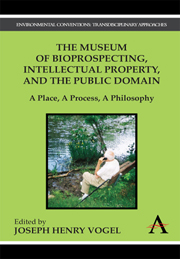 The Museum of Bioprospecting, Intellectual Property, and the Public Domain
The Museum of Bioprospecting, Intellectual Property, and the Public Domain Book contents
- Frontmatter
- Contents
- List of Figures
- Preface
- Acknowledgements
- Introduction: The Bauplan
- Chapter 1 Looking the Gorgon in the Face
- Chapter 2 Museums as Venues for Polemics
- Chapter 3 The Museum as a Vehicle for Considered Judgments on Access and Benefit Sharing
- Chapter 4 Clearing the Air: Applying the Intellectual Property Framework to National, Community, and Individual Rights in The Convention on Biological Diversity
- Chapter 5 The Anti-Commons Threat to Farmers' Rights: The Case of Crop Germplasm
- Chapter 6 The Moral Foundations of Intellectual Property and Conservation through Access and Benefit-Sharing
- Conclusions: The Nameless Interloper in The Museum of Bioprospecting, Intellectual Property, and the Public Domain
- Appendix: The Original Essay: A Proposal Based on “The Tragedy of the Commons:” Museum of Bioprospecting, Intellectual Property Rights, and the Public Domain
- Notes
- Index
Chapter 6 - The Moral Foundations of Intellectual Property and Conservation through Access and Benefit-Sharing
Published online by Cambridge University Press: 05 March 2012
- Frontmatter
- Contents
- List of Figures
- Preface
- Acknowledgements
- Introduction: The Bauplan
- Chapter 1 Looking the Gorgon in the Face
- Chapter 2 Museums as Venues for Polemics
- Chapter 3 The Museum as a Vehicle for Considered Judgments on Access and Benefit Sharing
- Chapter 4 Clearing the Air: Applying the Intellectual Property Framework to National, Community, and Individual Rights in The Convention on Biological Diversity
- Chapter 5 The Anti-Commons Threat to Farmers' Rights: The Case of Crop Germplasm
- Chapter 6 The Moral Foundations of Intellectual Property and Conservation through Access and Benefit-Sharing
- Conclusions: The Nameless Interloper in The Museum of Bioprospecting, Intellectual Property, and the Public Domain
- Appendix: The Original Essay: A Proposal Based on “The Tragedy of the Commons:” Museum of Bioprospecting, Intellectual Property Rights, and the Public Domain
- Notes
- Index
Summary
One of the great questions of our time is how to promote global economic development, while preserving the biological and cultural diversity of “this fragile earth, our island home.” The international debate over how to reconcile these two seemingly conflicting goals has increasingly focused on the interplay among three international agreements that have entered into force during the past 15 years. An examination of the moral foundations of those three agreements can greatly illuminate the Rawlsian notion of “procedural justice,” and the “fair and equitable” objectives of the Convention on Biological Diversity (CBD), as already cited by Manuel Ruiz (Chapter 3) and Tomme Young (Chapter 4).
The CBD was opened for signature at the Earth Summit in Rio de Janeiro in June 1992. As elaborated elsewhere in this volume, it seeks to promote the conservation, sustainable use, facilitated access to, and the equitable sharing of benefits arising out of the utilization of genetic resources. As a part of this overarching objective, Article 8(j) specifically calls upon its members to “respect, preserve and maintain knowledge, innovations and practices of indigenous and local communities embodying traditional lifestyles relevant for the conservation and sustainable use of biological diversity, and to promote their wider application with the approval and involvement of the holders of such knowledge, innovations and practices and encourage the sharing of benefits arising from the utilization of such knowledge, innovations and practices.”
- Type
- Chapter
- Information
- The Museum of Bioprospecting, Intellectual Property, and the Public DomainA Place, A Process, A Philosophy, pp. 73 - 88Publisher: Anthem PressPrint publication year: 2010


